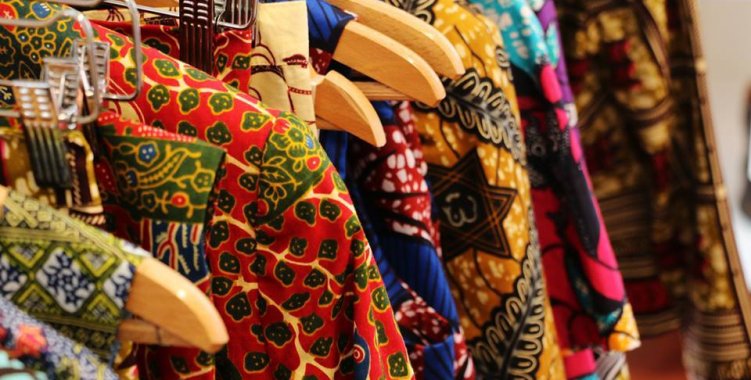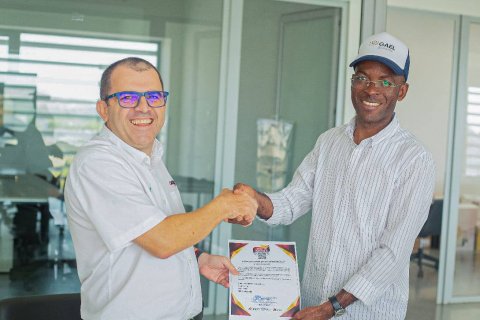Maria Lopes, 83, divided her life between Angola and Portugal. In Angola, where he lived until the 25th of April, she used African fabric (known as Congo cloth) to decorate his home and make clothes for himself and his family.
She remembers buying the cloths from the greengrocers, the typical Angolan sellers, who also used these "showy cloths with lots of color".
The taste for these fabrics continued in Portugal, but in this country few Portuguese women used them, being more present in the community of African origin.
Before e-commerce, it was difficult to buy cloths, and that's why she would ask friends who went to Angola or bring it with her when she went there. Now, she already has suppliers and it is from them that she buys the raw materials for the products she sells on the "Kutungas" (sewing) website.
"A few years ago, no one remembered that. Today, I receive compliments from everywhere and, in addition to my articles, they still want to buy cloths from me, which I don't do", the businesswoman told Lusa.
Maria Lopes interprets this fashion as the fact that the African community is today "stronger and prouder of its culture", but highlights that it is not just Africans and people of African descent who demonstrate this taste, having many foreign clients.
Its most successful products are tablecloths and bags.
Olga Figueira, 48, learned how to transform capulana, an African cloth used in Mozambique, during the covid-19 pandemic and never stopped.
She had previously owned a craft store and, at the time, realized that this fabric was very popular. Today, through the "Capulanamania" website, she sells items all over the world, "even to Taiwan", as she told Lusa.
She likes to transform these fabrics, which are already "beautiful and capable of adapting to almost anything", into products such as bags, cushions, shirts, earrings and headbands, with skirts being the most popular item.
For Olga Figueira, Portuguese women increasingly like these fabrics, although they opt for more discreet patterns, that is, capulanas from southern Mozambique, where they come from.
"The market is growing, there are a lot of people selling items with African cloth and we need to know the trends to continue selling," she said.
Their focus is on quality, which can only be achieved with the original capulanas, which are 100 percent cotton, which also "determines the price".
Andreia Fortuna (Portuguese) and Valdo Dias (Mozambican) created the brand "Mwani Store" in 2018, through which they sell all types of products made with capulana.
"When we created the brand, we detected that capulana was still used in a very traditional way and we wanted to make it more contemporary and adapt it to Western realities", said the owner of the store, located in Pinhal Novo and which also has a website.
Bags, book covers, key rings, hats, backpacks, clothing, in this store you can find hundreds of items for sale that have capulana in common, which "has excellent quality and the advantage of having very strong colors; Their combination is incredible", she said.
And she continued: "We cannot think that it is just a fabric, because the affection and care with which women treat this fabric are different. Each of them may have several stories to tell: from the capulana who carried her first child, to the one with which married his daughter, the one who carried the harvest of a certain year, etc.", she said.
Regarding the apparent success of this fabric, the businesswoman considers that, "in the same way that capulana was taken to the African continent as commercial exchanges between Arabs, Persians and people who lived along the coast, today the cultural diversity derived from globalization of people causes cultures to often adapt to new foods, traditions and languages."
"In the case of capulana, we believe that, especially in Portugal, with the Portuguese having such a strong connection in the past with Mozambique, for example, that there is a different appreciation and knowledge about this noble raw material", she said.
Joana Costa, responsible for the Capuloza store, which opened this year in Azeitão, and also online, told Lusa that the Portuguese have been rediscovering the African cloth, despite having lived with it forever.
"In the past, capulana was used more by people linked to Mozambique, but now more and more Europeans are using it. And there are also those who like the cloths, but still don't have the courage to use them," she said.
In her store there are 79 capulana prints and it is with them that items are made, from clothes to decoration, with table bases and lampshades being the most sought after.
"What sets us apart is that we can apply the pattern the customer chooses to all products. And there are many, all of them very beautiful and in 100 percent cotton fabrics," she highlighted.







